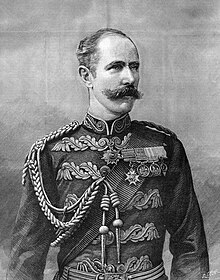Our website is made possible by displaying online advertisements to our visitors.
Please consider supporting us by disabling your ad blocker.
Herbert Stewart
Sir Herbert Stewart | |||||||||||||||
|---|---|---|---|---|---|---|---|---|---|---|---|---|---|---|---|
 Engraving in The Illustrated London News, February 1885 | |||||||||||||||
| Born | 30 June 1843 Sparsholt, Hampshire, England | ||||||||||||||
| Died | 16 February 1885 (aged 41) near Jakdul, Sudan | ||||||||||||||
| Allegiance | United Kingdom | ||||||||||||||
| Service | British Army | ||||||||||||||
| Years of service | 1863-1885 | ||||||||||||||
| Rank | Major-general | ||||||||||||||
| Battles / wars | Anglo-Zulu War First Boer War Anglo-Egyptian War Mahdist War | ||||||||||||||
| Awards | Order of the Bath Order of Saint Sava[1] Order of Osmanieh | ||||||||||||||
| Personal information | |||||||||||||||
| Height | 5 ft 11[2] in (1.80 m) | ||||||||||||||
| Batting | Right-handed | ||||||||||||||
| Role | Wicket-keeper | ||||||||||||||
| Domestic team information | |||||||||||||||
| Years | Team | ||||||||||||||
| 1869 | Marylebone Cricket Club | ||||||||||||||
| 1869 | Hampshire | ||||||||||||||
| Career statistics | |||||||||||||||
| |||||||||||||||
Source: Herbert Stewart at ESPNcricinfo | |||||||||||||||
Major-General Sir Herbert Stewart KCB (30 June 1843 – 16 February 1885) was an English first-class cricketer and British Army officer. A career soldier, he joined the 37th Foot in November 1863 and would later transfer to the 3rd Dragoon Guards. He would see action in South Africa in the Anglo-Zulu War of 1879 under the command of Major-General Frederick Marshall, and served shortly after the conclusion of that conflict in the actions against Sekhukhune I of the Bapedi. Returning to South Africa in 1881, he saw action in the First Boer War and was captured following the Boer victory at Majuba Hill in February 1881. Released in March 1881, Stewart would served in the Anglo-Egyptian War of 1882, where he was instrumental in the capture of both Cairo and the rebel leader Ahmed Urabi; he was highly decorated for his role in the war. After Major-General Charles Gordon became besieged Khartoum by Sudanese Mahdist forces, Stewart led a column across the desert as part of the Gordon Relief Expedition. After several engagements, Stewart was wounded in action on 19 January 1885. He survived long enough to hear of his promotion to Major-General, before succumbing to his wound on 16 February 1885.
Earlier in his life, he had played cricket at first-class level for Hampshire and the Marylebone Cricket Club as a wicket-keeper in 1869.
- ^ Acović 2012, p. 596.
- ^ Haygarth 1876, p. 409.
Previous Page Next Page


